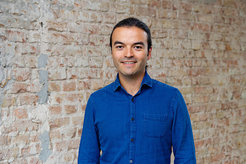Starting out on one´s own
A conversation with Startup founder Carlos Chacón
Findings from basic research can be the starting point for launching a company. Carlos Chacón conducted research on hair stem cells at the Max Planck Institute for Biology of Ageing and now develops an innovative solution for hair loss with his own company. We talked to him about his path to his own business.

How was the launch of your own business?
I founded my company "Mane Biotech" in April 2019. First, I went through an accelerator program called "Entrepreneur first". It's based in Berlin, so I moved there for three months. They bring together talented people from different fields. You do a kind of speed dating to find people who have a similar vision and can bring complementary skills. With the newly formed team, you go through a selection process. In the end, the investors were convinced that the company had the potential to succeed at scale, and in return for 10% equity, they provided us with funding to get started.
Why did you want to start a company in the first place? How did the idea come about?
I studied biotechnology in Colombia and always had the idea of doing something "applied" with biology. During my research on hair stem cells as a postdoc in Sara Wickström's group at the MPI for Biology of Ageing, I realized that obvious problems exist for which there are no solutions yet, such as wound healing or hair loss. So, I thought that these stem cells could be used to address these problems. Of course, I was fortunate to have done research on something that has a great application potential.
How did you develop your business model? Did you write a business plan at the beginning?
You don't need to write a classic business plan. In fact, I never wrote one. Of course, you have to do a detailed analysis and think about: What is the problem? What is the solution? What is the market? What is the competitive advantage? Is my team suited to solve the problem? The key is to ask: Does my idea solve a problem that people are willing to pay for? Then I challenged my idea daily with all type of people and, specially, with customers to find out whether or not it was a good business idea.
What does your company do? What is the product?
Our product helps against hair loss. It is a kind of wearable that you should use at home daily. It reactivates physiological hair growth. When you lose hair, the stem cells are inactivated by hormones. We can stimulate these stem cells to make them grow hair again. First, the hair loss stops, and then, the hair grows back over time. And we know it works!
How did you acquire the business knowledge that you need as an entrepreneur?
It's a constant learning process. We are developing a real product and there is a lot of processes’ complexity and regulations to deal with. We are still at the beginning and not selling yet. I am super excited that we recently raised venture capital funding to get our product on the market. I have a co-founder with commercial background and I also had a second co-founder with engineering education. Besides, I gathered contacts in events and co-working spaces; there you could always ask someone for advice, for example, if someone knows a lawyer or someone who can design a website, etc.
What do you like most about being self-employed?
I like being independent and being my own boss. I can set the priorities and shape my own business. I am also very flexible with my working hours. And it excites me to see my company grow. I feel like I can have a direct impact on other people's lives and help solve a real problem.
And what do you find most challenging about it?
The challenge is that you need a lot of motivation, grit and perseverance. Having a Startup is like a roller coaster ride. You don't have anybody telling you what to do. I had to invest my own money. That's risky. But even if it doesn't go the way I want, I have the satisfaction that I’ve pursued my dreams and I’ve learned a lot on the way.
Do you miss research?
I have very mixed feelings about that. I don't think I was ever meant to be a group leader, and that was never my goal. What I miss are the deep conversations about science. Scientists are so like-minded that you can really discuss a lot and have fun with it. In the business world, it's a bit the opposite: the less details you say, the better. I have always found the atmosphere in science and research to be very enjoyable.
Do you think it is necessary to speak fluent German to start a business in Germany?
I speak German, but on the professional level I don't feel it's good enough. I speak English with investors and that's not a problem. If you speak German great, it's still much better because German-speaking investors feel more comfortable. I think the personal relationships are better then.
What is your advice to future entrepreneurs?
Dream big and make a plan to achieve your dreams; then execute the plan! Also participate in events where you can meet other founders or aspiring-to-be founders. It's important to talk to people who have already started a company to learn from their experiences. And it is very useful to have a network. For example, I learned about a co-working space at one such event, which was then very helpful for me.












